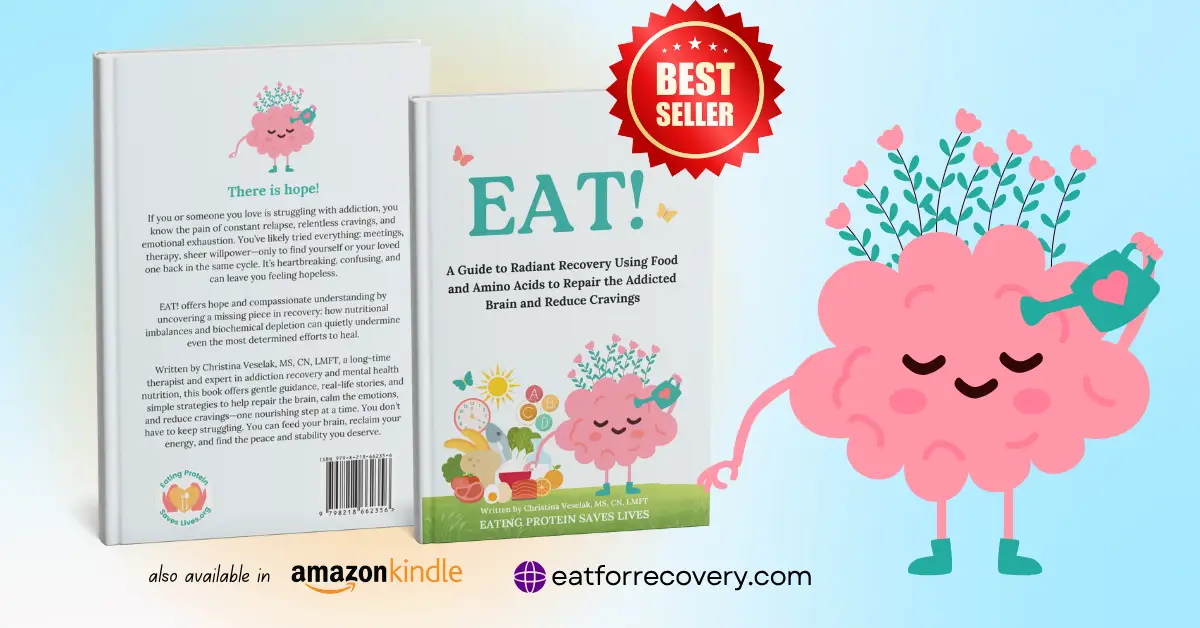By Christina Veselak MS, LMFT, CN. Director, The Academy for Addiction and Mental Health Nutrition
In honor of Stress Awareness Month, I would like to explore the roles our four mood-mediating neurotransmitters play in helping us cope with stress, and how to support their function using amino acid therapy. They all actually work together to form a lovely dance of molecules which allow us to flow more gracefully with the huge variety of stressors we are confronted with on a daily, hourly and sometimes minute-by-minute basis.
Let’s start with the Catecholamines – which are often referred to as our “stress hormones”. These include dopamine, norepinephrine and epinephrine or adrenaline. When over-expressed, too much norepinephrine and adrenaline can make us feel “stressed” – overwhelmed, anxious, jittery or even panicky. This is where the amino acids GABA and theanine shine. Taking them orally can quickly relax tense muscles, stop the spin, slow down fast shallow breathing, and allow us to more calmly and coolly think through the problem and respond effectively. They can be taken as needed – before picking kids up from school or during a contentious staff meeting, for example. They can also help us release the pent-up stress of the day and relax into sleep. Calming herbs, which support the GABA system, such as hops, valerian, skullcap or passionflower make a lovely evening tea as well. However, I would avoid frequent use of Kava. It has been shown to be dependency forming in susceptible people, and should be reserved for special occasions, as was its traditional use.
But sometimes the opposite happens! Have you ever felt too exhausted and drained to step up? Sometimes it seems like our brains simply cannot make these “get-up-and-go” chemicals fast enough, and our adrenal glands are no longer responding effectively. We actually need more! The amino acid L-Tyrosine may save the day here, along with adrenal support nutrients. Within 20 minutes, the right dose of Tyrosine turns into Dopamine, and then norepinephrine and adrenaline as needed, giving us a much-appreciated boost in energy, endurance, focus and drive. The US military has extensively studied Tyrosine, and has found that administering it before and during stressful situations significantly lowered markers of stress. Oddly enough, it has also been shown to lower stress-induced high blood pressures in some studies. (L-Tyrosine Monograph. Alternative Medicine Review, Volume 12, #4, 2007)
Our own thoughts, feelings and internal perceptions can cause stress as well. Perhaps you have said to yourself, “I know I shouldn’t worry, but I can’t stop myself!” Or you have found yourself getting dry-mouthed and anxious just thinking about going on a date, or giving a presentation at work or school. Maybe the thought of one pillow out of place, makes you want to cancel the party you’re giving in a few hours, and yell at everyone around you for messing up your party. While it may seem like these responses are your fault, or “just the way I am”, they are actually signs of low Serotonin levels. Serotonin helps us to feel good about ourselves and others, relax and flow with things outside of our control, and settle our thinking down so that we can sleep without obsessive worry and rumination. A dose of the over-the-counter amino acids L-Tryptophan and 5HTP, can turn off these stressful responses within a few minutes, and allow you to step up with grace and confidence. They may also help you more easily move into trust in your Higher Power, and even surrender the need to control every aspect of your life and the lives of people around you. It is not a good idea to take these precursor amino acids while on certain anti-depressants, so be sure to find a trained coach, or do some research first.
Finally, coping with physical pain, or the emotional pain that comes from the loss may be very stressful indeed. People with both acute and chronic pain may live with higher-than-normal levels of the “stress” hormone cortisol, which is released to support coping behaviors. Endorphins are a class of neurotransmitter that is released to blunt emotional and physical pain. They can also bring a sense of comfort that eases the pain of grief and loss, and can increase the experience and enjoyment of bonding and emotional connectedness. A high-protein diet provides the variety of amino acids which comprise them. A high-protein diet of course, also provides the individual amino acids which create the other neurotransmitters which we have discussed. D-phenylalanine, a synthetic amino acid available online, but not over the counter, also promotes Endorphin activity in the brain and can bring comfort in painful situations. Some people absolutely love taking a little bit of DLPA, found in vitamin stores, every day. This supports both the Catecholamines and the Endorphins and in general helps life to feel less stressful and more enjoyable. Think of it as supporting the “warm fuzzies”!!!
Thus, amino acid therapy is a powerful and safe addition to your stress management tool box and can often take the place of medication, when the stress seems too much to handle. Since stress itself can deplete these neurotransmitters to the point that we have trouble coping, it simply makes sense to use simple, natural means to quickly rebuild them as needed. Please feel free to reach out for more information.







